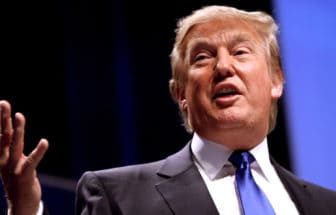Super PACs running presidential shadow campaigns? Nary a word.
“Dark money” nonprofits pumping hundreds of millions of dollars into politics? Nada.

Gage Skidmore / Creative Commons
“I give to everybody. When they call, I give,” Donald Trump said at Thursday’s debate, quickly adding that he considers the nation’s political money system a “broken system.” Trump is shown here speaking at the Conservative Political Action Conference (CPAC) in Washington in 2011. (Photo CC info)
Seventeen Republican presidential candidates — 10 in a main event, seven in an undercard — gathered Thursday in Cleveland and largely avoided debating several weighty campaign finance issues that have already dominated Election 2016.
But there were a few exceptions amid their sparring over foreign policy, social issues, immigration and education.
Midway through the debate, Fox News co-moderator Bret Baier explained that Donald Trump has given money to numerous Democrats over the years.
Baier then noted that Trump has previously stated that politicians do favors for contributions.
“You better believe it,” Trump told Baier.
“I give to everybody. When they call, I give,” Trump said, quickly adding that he considers the nation’s political money system a “broken system.”
Trump said that a decade ago, after he made a donation to Democratic presidential frontrunner Hillary Clinton, then a senator, he asked Clinton to come to his wedding.
“She had no choice, because I gave,” Trump said. (A Clinton aide said Trump’s assertion was “ridiculous” and “hurt” Clinton’s feelings.)
Trump then noted that he’s given money to some of the nine presidential hopefuls on the stage with him during the two-hour debate at Quicken Loans Arena.
Former Arkansas Gov. Mike Huckabee, however, interrupted him, saying he hasn’t received a contribution from Trump.
“You’re welcome to give me a check, Donald, if you want,” Huckabee said.
Left unsaid between the two White House hopefuls: According to federal campaign finance records, Trump in 2012 made a $2,500 to Huck PAC, a political action committee led by Huckabee.
In another exchange, New Jersey Gov. Chris Christie poked at Sen. Rand Paul of Kentucky for giving speeches on the floor of the U.S. Senate — then quickly posting the videos online and fundraising off of them.
Paul didn’t immediately have an opportunity to respond, and the two politicians never returned to the issue.
From January through June, three dozen presidential candidate-backing super PACs collectively raised more than $266 million while the campaigns of 2016 presidential hopefuls collectively raised just half that much — about $130 million — according to a Center for Public Integrity review.
Election 2016 is on pace to easily become the most expensive federal election in U.S. history.
K Street wasn’t a major focus of either debate. But Washington, D.C.’s lobbying class didn’t escape completely unscathed.
If you’re looking for a candidate who will “get in bed with the lobbyists and the special interest … then I’m not your guy,” Sen. Ted Cruz of Texas said.
During Thursday afternoon’s warm-up debate, featuring seven Republicans whose poll numbers ranged from dismal to virtually nonexistent, former New York Gov. George Pataki took a swipe at the “crony capitalism” of Washington, D.C.
It’s a place, he said, where “lobbyists and the powerful can get tax breaks and tax credits, and the American people don’t get laws in their interest.”
Pataki added that he can change the situation: “I can do that. And I can do it regardless of what the makeup of Congress is because I did it in New York state.”
Former Hewlett-Packard Chief Executive Carly Fiorina at one point noted that she — unlike Trump — has not received a personal phone call this year from former President Bill Clinton, a Democrat.
“Maybe it’s because I hadn’t given money to the [Clinton] Foundation or donated to his wife’s Senate campaign,” Fiorina snarked.
Trump, of course, wasn’t around to argue.
Co-moderator Bill Hemmer noted to former Virginia Gov. Jim Gilmore that Clinton said she wouldn’t nominate someone to the Supreme Court who supported the Citizens United v. Federal Election Commission decision.
Gilmore said he would appoint people to the Supreme Court who “would follow the law.”
So what of Clinton?
She sent an email to supporters Thursday night saying she wasn’t watching the debate.
Instead, she was fundraising off it.
“I wanted to take a moment to ask you to chip in $1 or more right now to fight for the vision you and I share,” Clinton wrote.